The coming of Cyber archaeologists.
Nov 03Will we need cyber archaeologists.
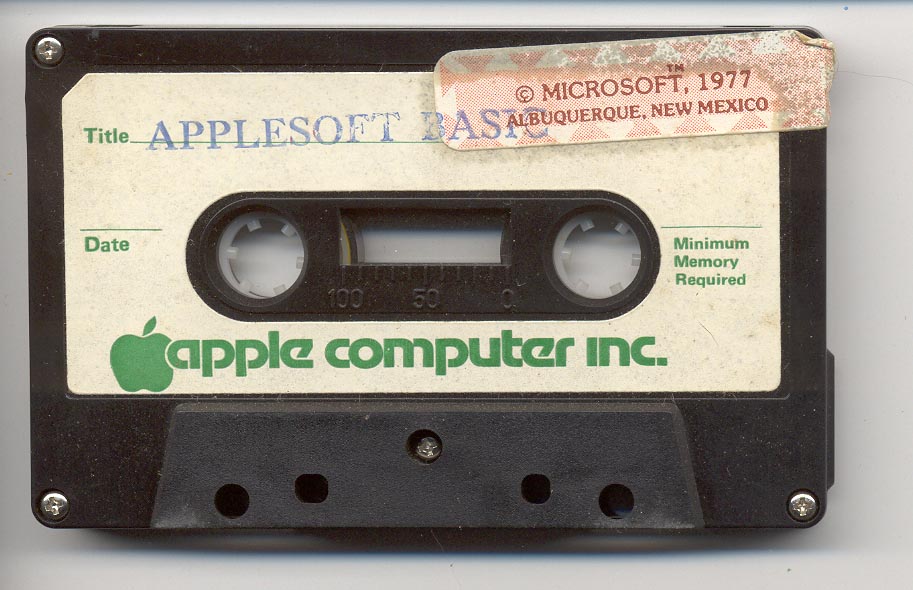 Looking at it, its the oddesd of things. This flimsy plastic box with two round holes in it, seems to come from another age. A brown warn little plastic tape worms itsself from one side of the container to the other. Only 20 some years old , the cassette is as obsolete as the dinosaurs. Yet a few weeks ago my dear aunt called me up in a panic, telling the tale how the evil old cassette player she had owned for so many years had 'eaten' a cassete with a recording on it of my late grandmother singing. I of course offered to go ahead and fix it. After half an hour of poking and prodding with a pair of tweezers and some sticky tape I managed to get the cassette back together. Now I just had to find a cassette player to play it on… It was at that moment i realised .. I did not have one anymore. The thought propped up to me that we store so much information these days on so many carriers, but yet all these media are futile and soon we won't be able to recover anything we stored 10 years ago because technology moves so fast. Will we need cyber archeologists in the future ?
Looking at it, its the oddesd of things. This flimsy plastic box with two round holes in it, seems to come from another age. A brown warn little plastic tape worms itsself from one side of the container to the other. Only 20 some years old , the cassette is as obsolete as the dinosaurs. Yet a few weeks ago my dear aunt called me up in a panic, telling the tale how the evil old cassette player she had owned for so many years had 'eaten' a cassete with a recording on it of my late grandmother singing. I of course offered to go ahead and fix it. After half an hour of poking and prodding with a pair of tweezers and some sticky tape I managed to get the cassette back together. Now I just had to find a cassette player to play it on… It was at that moment i realised .. I did not have one anymore. The thought propped up to me that we store so much information these days on so many carriers, but yet all these media are futile and soon we won't be able to recover anything we stored 10 years ago because technology moves so fast. Will we need cyber archeologists in the future ?
Media are futile.
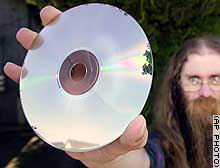 There are few media that survive the test of time. Even paper turns to dust after so many hundred years, depending on how it is stored. And so are the media we store stuff on today. The average lifespan of a cassette tape, a cd-recordable, a dat tape or even a floppy disk does not even come close to the lifespan of paper. Yet while a single peace of paper can hold out for a hundred years, a DVD rom with all the collected works of Plato won't last a hundred years at all. The loss off information that can occur when our media turn sour is only multiplied by the enormous amounts of data they can carry. To loose a single sheet of paper over the course of a thousand years might be a loss, To loose a thousand documents on a single cd-rom after 10 years is even worse. So what is there to do but to transfer information from medium to medium in order to let it stand the test of time ? Or what if we find the carrier that will last us to infinity.. What format must we use to write our data ?
There are few media that survive the test of time. Even paper turns to dust after so many hundred years, depending on how it is stored. And so are the media we store stuff on today. The average lifespan of a cassette tape, a cd-recordable, a dat tape or even a floppy disk does not even come close to the lifespan of paper. Yet while a single peace of paper can hold out for a hundred years, a DVD rom with all the collected works of Plato won't last a hundred years at all. The loss off information that can occur when our media turn sour is only multiplied by the enormous amounts of data they can carry. To loose a single sheet of paper over the course of a thousand years might be a loss, To loose a thousand documents on a single cd-rom after 10 years is even worse. So what is there to do but to transfer information from medium to medium in order to let it stand the test of time ? Or what if we find the carrier that will last us to infinity.. What format must we use to write our data ?
Formats are fleeting
If your average DLT tape will turn brittle and break in a hundred years you might just have been lucky. Think not of the medium the information is written on , think of the format the information is stored in. Format types like .doc , .xls and so on are even more fleeting then their carriers. You can make your programs backward compatible into the extreme , supporting exotic fileformats of days long gone is a painfull task. Some, like .html, .txt .pdf and .rdf, might be supported for years to come, but what about other, exotic and propriatary standards, formats of backup programs and so on. One might hold a treasured box of data in ones hand but if the fileformat is no longer supported .. How can we ever access it ? Perhaps we will find the key to the format .. but what about the system it was written for ?
Systems are fleeting
 It can be even worse. Say we have salvaged the medium and have somewhere found the original application to read it with. What if it only runs on specific hardware ? An evolution that is even faster then the formats and the media , must be the hardware ! What if the information we need only runs on some ancient system like say for example a commodore 64 ? Where to find one ? and even more importantly : where to find the parts if something breaks. Even to this day some "legacy' programs that are still being used in production, run on hardware that is no longer supported by the manufacturer. So what do we have to do ? Store both the information, the media, the original application AND the hardware it runs on in our archives ? What can be so important that we need to go through all this hassle ?
It can be even worse. Say we have salvaged the medium and have somewhere found the original application to read it with. What if it only runs on specific hardware ? An evolution that is even faster then the formats and the media , must be the hardware ! What if the information we need only runs on some ancient system like say for example a commodore 64 ? Where to find one ? and even more importantly : where to find the parts if something breaks. Even to this day some "legacy' programs that are still being used in production, run on hardware that is no longer supported by the manufacturer. So what do we have to do ? Store both the information, the media, the original application AND the hardware it runs on in our archives ? What can be so important that we need to go through all this hassle ?
what is important
"So what .." I hear you say ? What if we loose that excell file thats 8 years old ? Who cares ? … But that is just it. We might know what information is important today, but we will never be able to tell what information is pivotal or trivial in the future. The first posting by Linus Torvalds on usenet might have been unimportant, Yett only history will tell wether this one event might be something for the historybooks. The fact is we store more and more information these days on systems, media and in formats that might not stand the test of time. Wether or not something will be important in the future is impossible to tell at this time, thus we risk turning the digital era we live in today, into tomorrows informational dark ages , from which nothing will be remembered in the future.
Cyber archaeologists
 I see a new profession emerging. Perhaps starting out as a niche market, later to evolve in something that will turn into an exact science. People who spend their time looking through old digital archives. Who have the skills to work with old legacy hardware, know which side is up on a floppy disk , and God forbid, even speak the language of the old commodore 64. Cyber-archeologists digging through our digital past, being able to unlock and uncover the secrets of the past and bring them back in the light of whatever modern civilisation there might be. A proffesion that holds both the keys to FINDING information and being able to ACCESS it aswell. A trait of archeologists not speaking of the jurrasic but of the "basic" or the "x86" period of the past …
I see a new profession emerging. Perhaps starting out as a niche market, later to evolve in something that will turn into an exact science. People who spend their time looking through old digital archives. Who have the skills to work with old legacy hardware, know which side is up on a floppy disk , and God forbid, even speak the language of the old commodore 64. Cyber-archeologists digging through our digital past, being able to unlock and uncover the secrets of the past and bring them back in the light of whatever modern civilisation there might be. A proffesion that holds both the keys to FINDING information and being able to ACCESS it aswell. A trait of archeologists not speaking of the jurrasic but of the "basic" or the "x86" period of the past …
Epîlogue
As evolution speeds up .. so does the regression of the past into oblivion.
I for one do think we will have them in the future. Experts in finding what was stored but yet was lost. Keepers of keys that can unlock the files from our past and bring them back. With the amount of information we produce, the digital legacy we leave behind… its unthinkable that these things would be lost forever in a period of only a few decenia. Prove me wrong .. Digg into your past and find the first digital document you ever made ? Perhaps you"ll need a cyber-archaeologists to complete the task.
Related Posts
The Office 2.0
Oct 07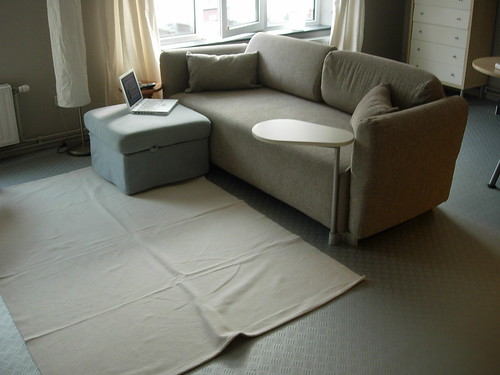 Yes yes , its the time of the year(s) again that the Knights in the Knightcastle get a little uneasy with the colors they painted on the walls , get bored with the arrangement of furniture and get overdosed by all the 'home improvement' programs on the tv. We dash out to the DIY store and go looking for paint. Now I must say I'm blessed with the fact that Nyana has excellent taste in colors. She picks out two shades of gray (that to me are not even different colors) and says.. 'This will go good together. ' As we left the store I remember grumbling and fretting that we did not go for some cappuccino like shades, and turning the room into one big Starbucks. But when the paint went on .. the result was amazing.The rooms we did so far are the bedroom and the office / small living room upstairs. Now in our bedroom we obviously sleep. (get your brains out of the gutter). But the office / living room is a different matter. This room used to be my office. But because I had room to spare we shoved in an extra couch and a tv so Nyana could hang out while I was behind my beloved workspace. It worked out so well that we spend the most part of the winter upstairs. Nice and cocoon-y. The wife in front of the tube, the resident geek on you-tube. But the mutter was in the clutter. Soon enough Mr geek thought it was needed to overstock the room with computer books, extra systems, a sound-mixer, microphone, main boards and cables lying around etc. To be honest , it sometimes looked like the lovechild of an overturned dumpster truck and a main board factory. This was neither relaxing nor efficient. Thus : The new office. Or could I say : The office 2.0.
Yes yes , its the time of the year(s) again that the Knights in the Knightcastle get a little uneasy with the colors they painted on the walls , get bored with the arrangement of furniture and get overdosed by all the 'home improvement' programs on the tv. We dash out to the DIY store and go looking for paint. Now I must say I'm blessed with the fact that Nyana has excellent taste in colors. She picks out two shades of gray (that to me are not even different colors) and says.. 'This will go good together. ' As we left the store I remember grumbling and fretting that we did not go for some cappuccino like shades, and turning the room into one big Starbucks. But when the paint went on .. the result was amazing.The rooms we did so far are the bedroom and the office / small living room upstairs. Now in our bedroom we obviously sleep. (get your brains out of the gutter). But the office / living room is a different matter. This room used to be my office. But because I had room to spare we shoved in an extra couch and a tv so Nyana could hang out while I was behind my beloved workspace. It worked out so well that we spend the most part of the winter upstairs. Nice and cocoon-y. The wife in front of the tube, the resident geek on you-tube. But the mutter was in the clutter. Soon enough Mr geek thought it was needed to overstock the room with computer books, extra systems, a sound-mixer, microphone, main boards and cables lying around etc. To be honest , it sometimes looked like the lovechild of an overturned dumpster truck and a main board factory. This was neither relaxing nor efficient. Thus : The new office. Or could I say : The office 2.0.
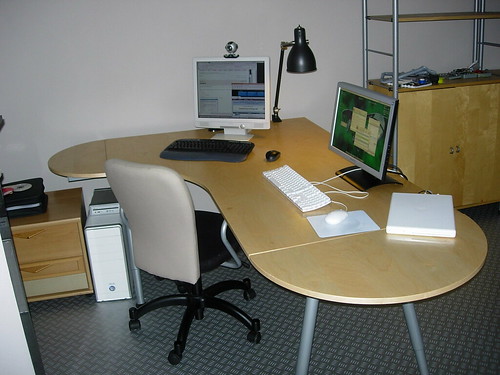
We started out with a ruthless philosophy. This place had to be clutter free. Asides from the absolute essentials this room would have to breath out calm and efficient vibes. In order to achieve a TV-room / loungeroom / workspace we made sure to check some markers.
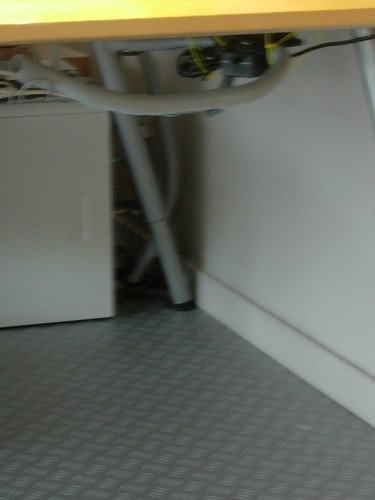
- Relaxing colors. Shades of gray replaced the beige and blue on the walls. The colors of the room should reflect calm-and-easy and by far attract any attention to themselves.
- Furniture : As little as possible. My big office (the biggest one Ikea had) was sized down to its smallest by removing some extentions. Every bit of furniture is color coordinated .. well thats more something of a coincidence since we buy everything at Ikea and it matches nicely.
- Cables : The lovely misses had an absolute zero tolerance policy for ANY cabling that was exposed to the naked eye. Also : NONE of the cables , power plugs or power supply's was allowed to hit the floor. A downpour of black power cables in front of an exposed office ? No way. Don't get me wrong. The girl is as geeky as can be .. But the place should not look like a fishing trawlers , nets included.
- No clutter : Books, ornaments and what-have-you's that where otherwise crammed in our cabinets where removed. Just a little plant here, and a model of my Enterprise NCC 1701 there. (and some nice starship diagrams nicely framed on the wall).Division bell ! : But probably the most important redesign was dividing the OFFICE (where you work) from the Lab / Studio / library part of a geeks room. Now 10 years of research have given us the conclusion that you cannot keep the geek out of the living room. And you cannot keep the clutter out of the geeks setup. So unless you want a TV room / IT-ground-zero.. You have to seperate the working geek , from the tinkering geek. Our conclusion ? Move the books / spare parts / lab equiptment of the resident geek to the hobby room upstairs. This meant that podcasting- studio setup went upstairs and is now safely out of direct sight.
The results.
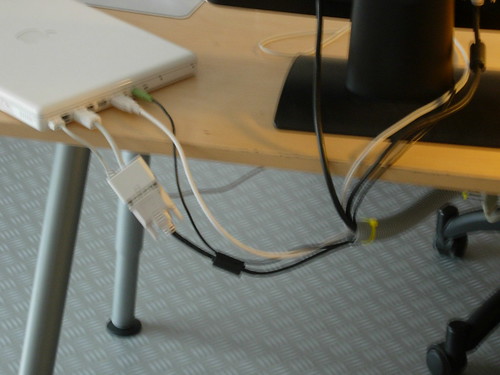 What can I say : The results are great. Allthough reluctant to give up my 'matrix style' surroundings of screens and keyboards piled up together. i'm honestly impressed by this new approach. My main desk now consists of my Macbook (docked) and one 19'' widescreen display. When in need of dual screen work , i just flip it open and am able to use my isight camera and more. Instead of using speakers and amplifiers I just routed the audio to either my headphones or the internal speakers of the monitor and thus having less clutter around. Next to this setup resides my Ubuntu machine hooked up to another 19” display. Because the resolution matches up to the resolutions of two other systems I have around the house (my TV computer and my test system) it can run remote desktop sessions to these machines full screen. Its like having them around.. Without having them around. Next , instead of using yet another computer to run Windows , i've opted to use virtual machine to emulate and run any other system I required. This all works fine on my AMD XP 3200 machine that has enough ram to run a nice little Windows XP either in Vmware Player or Paralells. So you see : More machines at my fingertips without taking up space.
What can I say : The results are great. Allthough reluctant to give up my 'matrix style' surroundings of screens and keyboards piled up together. i'm honestly impressed by this new approach. My main desk now consists of my Macbook (docked) and one 19'' widescreen display. When in need of dual screen work , i just flip it open and am able to use my isight camera and more. Instead of using speakers and amplifiers I just routed the audio to either my headphones or the internal speakers of the monitor and thus having less clutter around. Next to this setup resides my Ubuntu machine hooked up to another 19” display. Because the resolution matches up to the resolutions of two other systems I have around the house (my TV computer and my test system) it can run remote desktop sessions to these machines full screen. Its like having them around.. Without having them around. Next , instead of using yet another computer to run Windows , i've opted to use virtual machine to emulate and run any other system I required. This all works fine on my AMD XP 3200 machine that has enough ram to run a nice little Windows XP either in Vmware Player or Paralells. So you see : More machines at my fingertips without taking up space.
And then there is the matter of the home server / media TV machine.
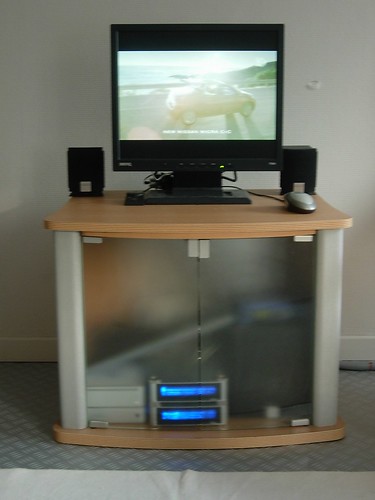 Instead of having a big ass tv in our little office/loungeroom we use a mac mini with a 19” screen and a TV tunercard. This whole setup (along with the main router) is compactly crammed into the little TV cabinet that we use. Having all that gear installed in that little space and just one cable leaving the setup makes up for serenity and no clutter whatsoever. To be on the safe side I did mount a smokedetector INSIDE the cabinet. Since the server keeps running at night, I want to be sure we are alerted should anything go wrong. This is a tip I give to all of you geeks who have machines running at night. Smokedetectors are cheap so , mount them over your “beyond midnight” machines.Epilogue.Allthough I did not expect it … the results are quite fab. Keeping the clutter out of the room has given us a very relaxing inviting room to be in. The screens are still the main focalpoints of attention, but due to the lack of crap around them, it works out just great. My main desk is this minimalistic fortress occupied only by 2 screens and two sets of keyboards. I thought this was going to bugg me. No extra stuff to twiddle and fiddle with seamed cumbersome. No pheripherals piled up around the setup was something to get used to . But imagine my surprise when I actually found out that I was much more focussed on my systems and could work in a concentraded manner. Also the lack of phisical devices makes one use the virtual possibilities of ones computer more. Less craptime = more screentime. The wife is very happy with all this having a couch strategicly posted in the middle of the room , facing the tv. I can look over her shoulder and peer along to the mainstream mayhem withouth having to leave my chair. All in all .. its a match in heaven.
Instead of having a big ass tv in our little office/loungeroom we use a mac mini with a 19” screen and a TV tunercard. This whole setup (along with the main router) is compactly crammed into the little TV cabinet that we use. Having all that gear installed in that little space and just one cable leaving the setup makes up for serenity and no clutter whatsoever. To be on the safe side I did mount a smokedetector INSIDE the cabinet. Since the server keeps running at night, I want to be sure we are alerted should anything go wrong. This is a tip I give to all of you geeks who have machines running at night. Smokedetectors are cheap so , mount them over your “beyond midnight” machines.Epilogue.Allthough I did not expect it … the results are quite fab. Keeping the clutter out of the room has given us a very relaxing inviting room to be in. The screens are still the main focalpoints of attention, but due to the lack of crap around them, it works out just great. My main desk is this minimalistic fortress occupied only by 2 screens and two sets of keyboards. I thought this was going to bugg me. No extra stuff to twiddle and fiddle with seamed cumbersome. No pheripherals piled up around the setup was something to get used to . But imagine my surprise when I actually found out that I was much more focussed on my systems and could work in a concentraded manner. Also the lack of phisical devices makes one use the virtual possibilities of ones computer more. Less craptime = more screentime. The wife is very happy with all this having a couch strategicly posted in the middle of the room , facing the tv. I can look over her shoulder and peer along to the mainstream mayhem withouth having to leave my chair. All in all .. its a match in heaven.





